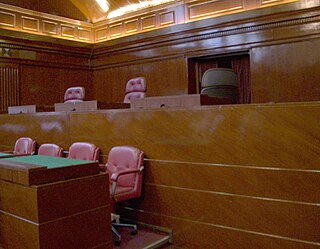Contempt of court, often referred to simply as "contempt", is the crime of being disobedient to or disrespectful toward a court of law and its officers in the form of behavior that opposes or defies the authority, justice, and dignity of the court. A similar attitude toward a legislative body is termed contempt of Parliament or contempt of Congress. The verb for "to commit contempt" is contemn and a person guilty of this is a contemnor or contemner.
Prima facie is a Latin expression meaning "at first sight", or "based on first impression". The literal translation would be "at first face" or "at first appearance", from the feminine forms of primus ("first") and facies ("face"), both in the ablative case. In modern, colloquial, and conversational English, a common translation would be "on the face of it".
An abuse of process is the unjustified or unreasonable use of legal proceedings or process to further a cause of action by an applicant or plaintiff in an action. It is a claim made by the respondent or defendant that the other party is misusing or perverting regularly issued court process not justified by the underlying legal action. In common law it is classified as a tort distinct from the intentional tort of malicious prosecution. It is a tort that involves misuse of the public right of access to the courts. In the United States it may be described as a legal process being commenced to gain an unfair litigation advantage.
A subpoena or witness summons is a writ issued by a government agency, most often a court, to compel testimony by a witness or production of evidence under a penalty for failure. There are two common types of subpoenas:
- subpoena ad testificandum orders a person to testify before the ordering authority or face punishment. The subpoena can also request the testimony to be given by phone or in person.
- subpoena duces tecum orders a person or organization to bring physical evidence before the ordering authority or face punishment. This is often used for requests to mail copies of documents to requesting party or directly to court.
An ex post facto law is a law that retroactively changes the legal consequences or status of actions that were committed, or relationships that existed, before the enactment of the law. In criminal law, it may criminalize actions that were legal when committed; it may aggravate a crime by bringing it into a more severe category than it was in when it was committed; it may change the punishment prescribed for a crime, as by adding new penalties or extending sentences; it may extend the statute of limitations; or it may alter the rules of evidence in order to make conviction for a crime likelier than it would have been when the deed was committed.
Contempt of Congress is the misdemeanor act of obstructing the work of the United States Congress or one of its committees. Historically, the bribery of a U.S. senator or U.S. representative was considered contempt of Congress. In modern times, contempt of Congress has generally applied to the refusal to comply with a subpoena issued by a congressional committee or subcommittee—usually seeking to compel either testimony or the production of requested documents.
In English and English-derived legal systems, an Anton Piller order is a court order that provides the right to search premises and seize evidence without prior warning. This is intended to prevent the destruction of relevant evidence, particularly in cases of alleged trademark, copyright or patent infringements.
Prejudice is a legal term with different meanings, which depend on whether it is used in criminal, civil, or common law. In legal context, prejudice differs from the more common use of the word and so the term has specific technical meanings.
In countries with a parliamentary system of government, contempt of parliament is the offence of obstructing the legislature in the carrying out of its functions, or in the hindering any legislator in the performance of their duties.
A criminal charge is a formal accusation made by a governmental authority asserting that somebody has committed a crime. A charging document, which contains one or more criminal charges or counts, can take several forms, including:
A private prosecution is a criminal proceeding initiated by an individual private citizen or private organisation instead of by a public prosecutor who represents the state. Private prosecutions are allowed in many jurisdictions under common law, but have become less frequent in modern times as most prosecutions are now handled by professional public prosecutors instead of private individuals who retain barristers.

Anurag Singh Thakur is an Indian politician from the Bharatiya Janata Party and a Member of Parliament in the Lok Sabha from Hamirpur, Himachal Pradesh. He was former Minister of Sports, Youth Affairs and Minister of Information and Broadcasting in the Second Modi ministry. His father, Prem Kumar Dhumal was a former Chief Minister of Himachal Pradesh.

Grant Murray Snow is an American lawyer and jurist who serves as a senior United States district judge of the United States District Court for the District of Arizona. Snow was previously a state court judge on the Arizona Court of Appeals from 2002 to 2008.

In Singapore, the offence of scandalizing the court is committed when a person performs any act or publishes any writing that is calculated to bring a court or a judge of the court into contempt, or to lower their authority. An act or statement that alleges bias, lack of impartiality, impropriety or any wrongdoing concerning a judge in the exercise of his judicial function falls within the offence. The High Court and the Court of Appeal are empowered by section 7(1) of the Supreme Court of Judicature Act to punish for contempt of court. This provision is statutory recognition of the superior courts' inherent jurisdiction to uphold the proper administration of justice. The Subordinate Courts are also empowered by statute to punish acts of contempt. Although Article 14(1)(a) of the Constitution of the Republic of Singapore protects every citizen's right to freedom of speech and expression, the High Court has held that the offence of scandalizing the court falls within the category of exceptions from the right to free speech expressly stipulated in Article 14(2)(a). Some commentators have expressed the view that the courts have placed excessive value on protecting the independence of the judiciary, and have given insufficient weight to free speech.

Shadrake Alan v. Attorney-General is a 2011 judgment of the Court of Appeal of Singapore that clarified the law relating to the offence of scandalising the court. Alan Shadrake, the author of the book Once a Jolly Hangman: Singapore Justice in the Dock (2010), was charged with contempt of court by way of scandalising the court. The Prosecution alleged that certain passages in his book asserted that the Singapore judiciary lacks independence, succumbs to political and economic pressure, and takes a person's position in society into account when sentencing; and that it is the method by which Singapore's ruling party, the People's Action Party, stifles political dissent in Singapore.

The basis of the Bahamian Law and legal system lies within the English Common Law tradition. Justices of the Supreme Court, Registrars and Magistrates are all appointed by The Governor-General acting on the advice of the Judicial and Legal Service Commission, which is composed of five individuals who are headed by the Chief Justice as their chairman. The Chief Justice and the Justices of the Court of Appeal, including the President, are appointed by the Governor-General on the recommendation of the Prime Minister after consultation with the Leader of the Opposition. Once appointed, the salaries and other terms of appointment of the Chief Justice, Justices of Appeal and Justices of the Supreme Court cannot be altered to their disadvantage. Justices of the Supreme Court can serve until the age of 65 years and, where agreed among the judge, the Prime Minister and the Leader of the Opposition, may serve until the age of 67. Justices of Appeal can serve until the age of 68 years and, where agreed among the judge, the Prime Minister and the Leader of the Opposition, may serve until the age of 70 years. The law of the Bahamas makes provisions for the appointment of 12 Justices to the Bench of the Supreme Court, inclusive of the Chief Justice, and for five Justices of the Court of Appeal, inclusive of the President. The Chief Justice, as Head of the Judiciary, is an ex officio member of the Court of Appeal, but only sits at the invitation of the President.
The administration of justice is the process by which the legal system of a government is executed. The presumed goal of such an administration is to provide justice for all those accessing the legal system.

On August 25, 2017, President Donald Trump pardoned Joe Arpaio for criminal contempt of court, a misdemeanor. Arpaio had been convicted of the crime two months earlier for disobeying a federal judge's order to stop racial profiling in detaining "individuals suspected of being in the U.S. illegally". The pardon covered Arpaio's conviction and "any other offenses under Chapter 21 of Title 18, United States Code that might arise, or be charged, in connection with Melendres v. Arpaio." The official White House statement announcing the grant of clemency described Arpaio as a "worthy candidate" having served the nation for more than fifty years "protecting the public from the scourges of crime and illegal immigration."
Linwood v Andrews (1888) is a landmark case in English Law and a Common law precedent regarding making misleading submissions to a court.
In India, the offence of contempt of court is committed when a person either disobeys a court order, or when a person says or does anything that scandalizes, prejudices, or interferes with judicial proceedings and the administration of justice. Contempt of court can be punished with imprisonment or a fine, or both.





